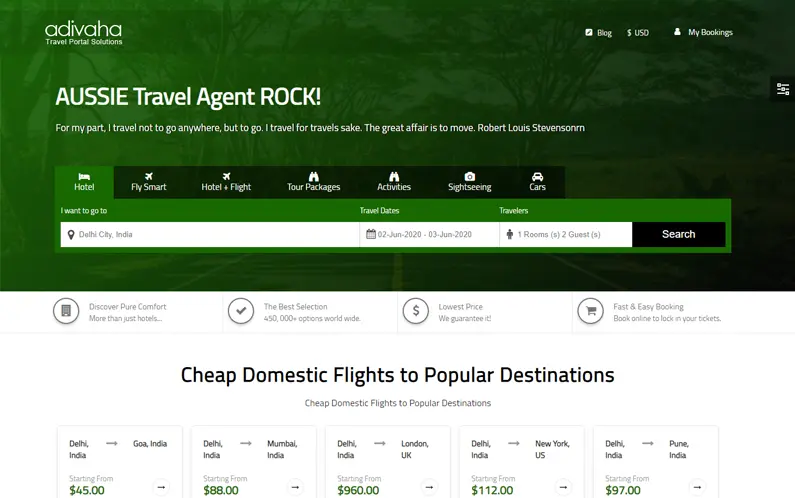Ready to go-LIVE travel solutions that helps your travel agency to sell a range of travel services pretty instantly. adivaha® travel solutions make sure you have no boundation over your imagination, you can do everything online, without the need for any technical knowledge or design skills. Easy Backoffice, extensive reporting with integrated Funds Management System.
Flight API booking engine revolutionizing travel industry.
A flight API booking engine acts as a gateway that allows travel agencies and online booking platforms to access flight data from multiple airlines through one unified interface. This technology simplifies the booking process by providing real-time flight information, availability, and pricing to users. As a flight API provider in India, our platform ensures seamless integration for businesses looking to offer flight booking services on their websites or applications. By using our flight API, travel companies can enhance their offerings, providing customers with a comprehensive selection of flights to choose from.
Integrating a flight API booking engine from a reputable flight API provider in India can significantly improve the efficiency and competitiveness of travel businesses. With access to a wide range of flight options and real-time data updates, companies can offer a more personalized booking experience to their customers. Utilizing a flight API enables travel agencies to expand their reach and cater to a larger audience by providing comprehensive flight search results. By integrating a flight API into their systems, businesses can streamline the booking process and offer competitive pricing, ultimately enhancing customer satisfaction and driving sales.
In today's fast-paced travel industry, leveraging a flight API is essential for staying ahead of the competition and meeting the increasing demands of tech-savvy travelers. As a leading flight API provider in India, we offer cutting-edge technology solutions that enable seamless integration of flight data into various platforms. By incorporating a flight API booking engine into their systems, businesses can stay competitive by offering a user-friendly booking experience, real-time updates, and a wide selection of flight options. Embracing flight API technology can revolutionize the way travel companies operate, ultimately leading to increased efficiency, profitability, and customer satisfaction.
Flight APIs have revolutionized the travel industry, offering seamless integration for businesses to provide up-to-date flight information and booking capabilities on their websites and applications. These APIs connect directly to airline systems, allowing access to real-time flight schedules, availability, and pricing. When considering the implementation of flight APIs, it's essential to factor in the flight-booking-api-cost associated with utilizing these services. The cost may vary depending on the provider and the specific features required, but the convenience and efficiency gained from integrating a flight booking API are well worth the investment.
In India, the demand for efficient flight booking APIs has been on the rise as more travelers turn to online platforms to book their flights. The availability of flight-booking-api-in-india has been crucial for travel agencies, online booking platforms, and airlines to streamline their booking processes and enhance customer experience. By integrating a reliable flight booking API tailored for the Indian market, businesses can offer users a convenient way to search for flights, compare prices, and make reservations seamlessly. The cost of utilizing such APIs is often justified by the increased booking efficiency and the ability to provide customers with accurate and instant booking confirmations.
The competition among providers offering flight APIs in India has led to a variety of options available at different price points. When assessing the flight-booking-api-cost, businesses must evaluate not only the initial investment but also the potential return on investment through increased bookings and customer satisfaction. By carefully selecting a flight booking API provider that meets their specific needs and budget, businesses in India can stay competitive in the rapidly growing online travel market. The integration of a reliable flight booking API can streamline operations, improve booking accuracy, and ultimately drive business growth in the dynamic and competitive travel industry in India.
Flight API booking engine revolutionizing travel industry. Flight APIs have become an integral part of the modern travel ecosystem, enabling seamless flight bookings for travelers around the globe. When it comes to flight-apis, one crucial factor that businesses consider is the flight-booking-api-cost. The cost associated with integrating a flight booking API into a platform can vary based on the provider and the level of customization required. In India, the demand for efficient flight-booking-api-in-India solutions is on the rise, with more travel agencies and online booking platforms leveraging these APIs to enhance their services and provide real-time booking options to customers.
The versatility and convenience offered by flight APIs are reshaping how travelers plan and book their journeys. By tapping into the vast data and functionalities provided by these APIs, businesses in the travel industry can create a more user-friendly experience for their customers. When evaluating the flight-booking-api-cost, it's essential to consider the long-term benefits that come with having a reliable and efficient booking engine. In the Indian market, the availability of robust flight-booking-api-in-India solutions has opened up new possibilities for local travel businesses to offer competitive services and stay ahead in the industry.
As the travel industry continues to evolve, the role of flight APIs in streamlining booking processes cannot be overstated. The adoption of advanced flight booking APIs is revolutionizing how travel agencies and online platforms operate, enhancing their efficiency and customer satisfaction levels. When considering the flight-booking-api-cost, businesses need to weigh the investment against the potential returns and increased revenue streams. In India, the growing popularity of flight-booking-api-in-India solutions highlights the industry's shift towards embracing technological advancements to meet the changing needs of modern travelers.
Keep Refreshing your customers - Who doesn't want his site to stand out from crowd? adivaha® gives you multiple options for home pages, headers, colors etc. Which can easily be managed from admin via shortcodes and settings. The theme supports almost all the big players in this market ie, WEGO, Travelpayouts, Agoda, Booking, Expedia etc.












